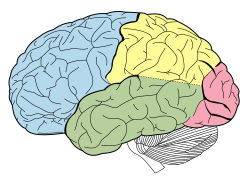Modern imaging techniques enable researchers to observe drug actions and consequences as they occur and persist in the brains of abusing and addicted individuals.
The frontal cortex (blue in the image) is a brain region that supports logical thinking, goal setting, planning, and self-control. Numerous studies have documented that addictive drugs cause volume and tissue composition changes in this region and that these changes are likely associated with abusers’ cognitive and decisionmaking problems.Incidentally, similar changes occur in the brains of those suffering from ADD and ADHD.
The addicted individual must abstain from drugs for weeks to months before the frontal hypofunction resolves. It would be of interest to see whether such resolution occurs shortly after the administration of the PURSOR protocol and the resultant resolution of craving.






No comments:
Post a Comment